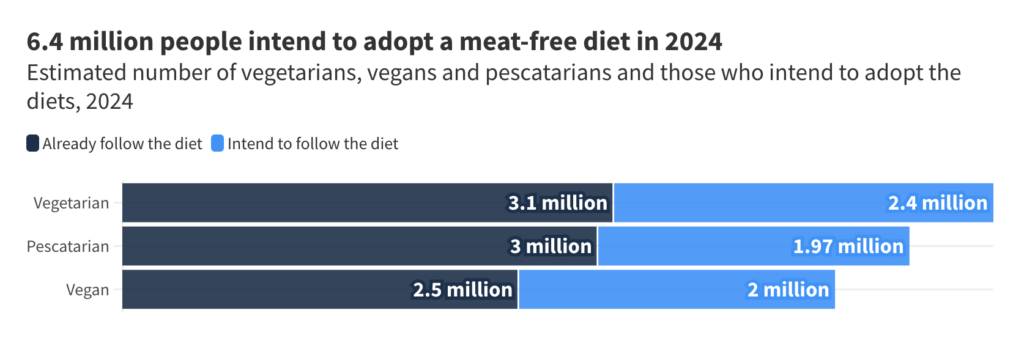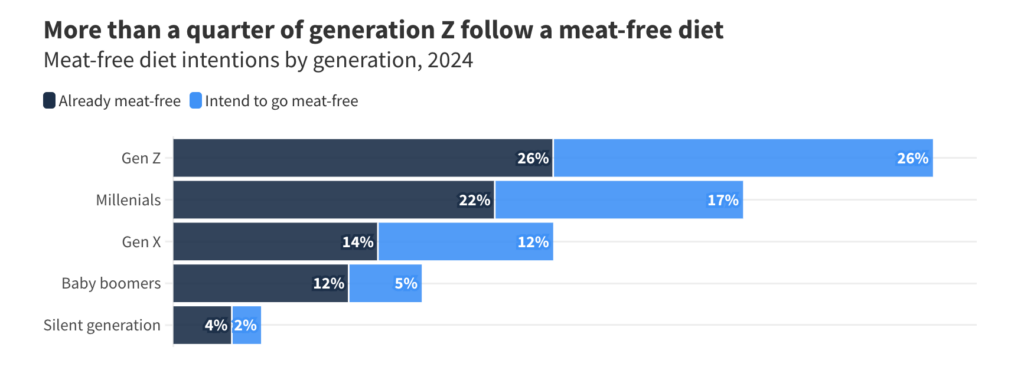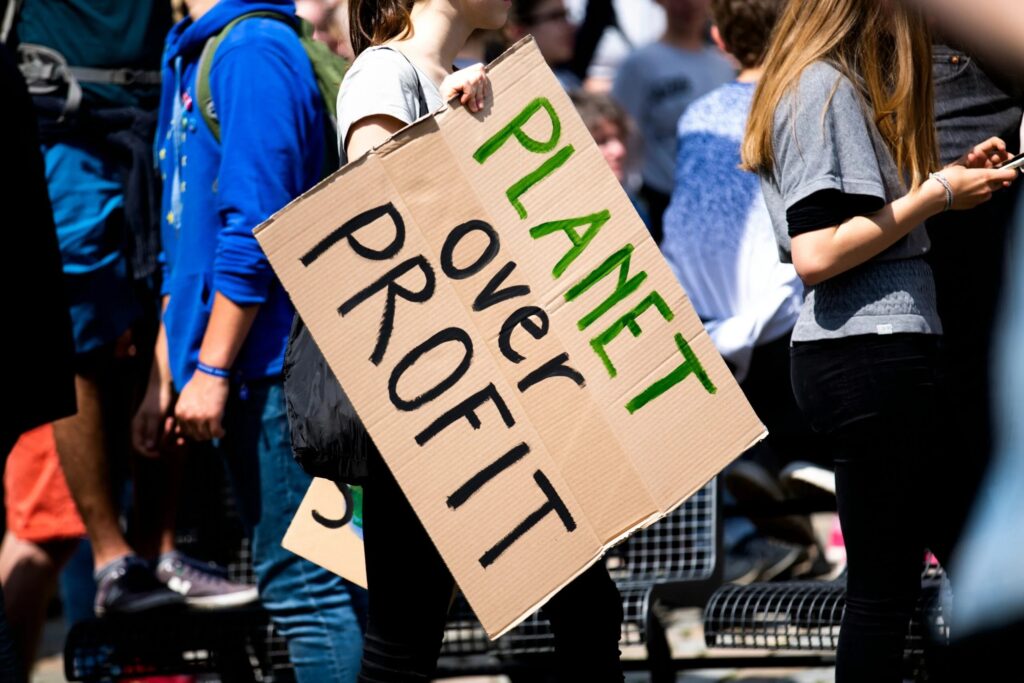Nearly 5% of Brits are Vegan, Following a Steep Rise in 2023 – But Climate Language Remains Unclear
6 Mins Read
The number of vegans in the UK has grown by 78%, reaching 2.5 million, according to an annual survey by Finder. This means 4.7% of adult Brits follow a plant-based diet – but separate research shows little understanding of climate language amongst the population.
While more people in the UK identify as vegan this year, there’s simultaneously a lack of understanding when it comes to language related to the climate crisis, according to two new studies.
As consumer awareness about the health and environmental implications of meat and dairy consumption and plant-based foods grows – helped by a string of new documentaries and a Veganuary campaign that is expected to break participation records yet again – more Brits are sticking to a vegan diet now than at any point in the last five years (at the very least).
But then again, despite this rise in education around the climate impact of animal-derived and plant-based foods – the former produce twice as many emissions as the latter – there is a disconnect when it comes to understanding climate and waste policy language. Terms like ‘green’ and ‘sustainable’ are clearly understood by only a minority of adults in the UK.
More Brits are vegan, led by Gen Z and Londoners
Research by personal finance website Finder has found that the UK’s vegan population grew from 1.4 million in 2023 to 2.5 million this year – a 78% rise – accounting for 4.7% of the total adult population. It’s a shift led by Gen Z, 9% of whom identify as vegan, and millennials (8%). Unsurprisingly, given its reputation as one of the vegan capitals of the world, London is responsible for the highest share (6.8%).
The 2,000-person nationally representative survey also revealed that there are 3.1 million vegetarians in the UK – or about 5.8% of the total – a figure that has slightly decreased from last year, but largely due to many converting to plant-based diets. Meanwhile, three million adults are pescetarians, taking the number of people on meat-free diets to 8.6 million (16% of the adult population).

Moreover, a further 6.4 million plan to adopt some form of meatless diet – two million aim to be vegan, 2.4 million vegetarian, and 1.97 million pescetarian. While it’s unlikely that everyone will stick to their intentions, if they were to do so, the UK would have 15 million meat-free adults by 2025, which is 28% of the population.
Over a quarter of Gen Zers (26%) are meatless consumers, with another 26% intending to follow one of these three diets, which means over half of Gen Z Brits could potentially stop eating meat. Similarly, 22% of millennials don’t consume meat, and 17% plan to stop doing so this year. There’s an upward trend of meat consumption with age: 14% of Gen Xers, 12% of baby boomers, and just 4% of the silent generation are on meat-free diets.
London also has the most adults avoiding meat, with a fifth (21.3%) either identifying as vegan, vegetarian or pescetarian. Meanwhile, 18% are hoping to add to this figure, meaning 39% of Londoners could be giving up meat come 2025. But the southwest of England has the lowest number of vegans (2.8%) and overall meat-free eaters (11.3%), although Scotland ranks last in terms of people who intend to stop consuming meat this year, with only 6% planning to do so.

The results mirror research by the Vegan Society last year, which found that 41% of non-vegan men are interested in switching to plant-based diets, with those aged 25-34 the most likely to try. “It’s really encouraging to learn that a significant proportion of men are interested [in] going vegan, but we are aware there is still work to be done, not only to support the general public in adopting a healthy vegan lifestyle, but particularly men who are exposed to the pressures of traditional masculinity,” said Hannah Montgomery, campaigns manager at the charity.
Finder’s survey comes on the back of a tough year for plant-based food in the UK, with meat-free products among the worst-performing grocery categories, as sales declined by £38.4M. It was ascribed to inflation due to the cost-of-living crisis, with prices being driven up for most food categories, but affecting vegan products more. Companies like Plant & Bean shut down, while Meatless Farm and VBites came close. Many chains – such as Neat Burger, Clean Kitchen Club, Flower Burger and Veggie Pret – closed locations, and brands including Oatly, Nestlé and Innocent pulled products from shelves.
But the growth of cheaper private-label brands is a positive sign. “With UK data showing supermarket own-label sales grew twice as fast as branded goods last year, we’ve seen British supermarkets take the opportunity to help make plant-based food more affordable by launching a range of own-label products over the last few weeks, Helen Breewood, research and resource manager at the Good Food Institute Europe told Green Queen earlier this month. “Retailers are increasingly seeing the value of this market, and we hope this trend will continue beyond Veganuary.”
Brits unclear on climate-related terms
But while the number of vegans may be up, the amount of the UK population able to clearly understand what different claims around climate change mean is “worryingly low”. Another nationally representative survey – this time of 1,000 UK adults – by insights company Trajectory and communications agency Fleet Street reveals that only 25% of respondents thoroughly understand the term ‘green’, while 26% can define ‘sustainability’ and 32% ‘organic’.
Even some of the more commonly used terms are met with a lack of consumer comprehension, such as ‘environmentally friendly’ (35%), ‘locally grown/seasonal’ (40%), ‘single-use plastic’ (47%), ‘recycling’ (55%), and ‘net zero’ (59%). And other phrases have even lower levels of understanding among Brits, including ‘carbon offsetting’ (11%) and ‘circular economy’ (4%).
There is a clear correlation between understanding and favourability, with consumers feeling most positive about the terms they understand the best, such as ‘recycling’, ‘single-use plastic’, and ‘locally sourced/grown’. Plus, the younger demographic (aged 18-24) is more confident here – for instance, ‘sustainability’ was understood by 24% more youngsters than those aged 65+.

And despite the confusion around some of the key terms, the analysis highlights the importance of effective communication: 90% of respondents believe it’s important for brands to talk about their sustainability initiatives, with 68% more likely to buy from a company with a clear climate strategy.
Meanwhile, 47% of consumers think brands have the biggest responsibility for delivering climate, and almost 48% feel companies are acting sincerely in their efforts. This veers into greenwashing territory, with a poll by the Chartered Institute of Marketing – covering 2,000 Brits and 1,193 online customers – last year revealing that two-thirds of consumers believe most brands are not being authentic when they talk about their environmental initiatives.
Government initiatives like the Green Claims Code, which lays out a six-point checklist to see if a business’s environmental claims are credible, and a ban on essential products linked to deforestation will help. So too will projects like the 2021-launched Provenance Framework, an open-source rulebook listing the criteria companies need to fulfil to make a true environmental claim, and avoid greenwashing and misleading consumers.
“While many businesses and brands are taking critical action to tackle the environmental crisis, it is clear from this research that communication is key and much more work needs to be done to engage consumers, starting with the language used – as a significant amount of it doesn’t appear to mean much to them,” said Fleet Street founder Mark Stretton.
“The lack of understanding around what many businesses would probably consider to be standard terms, such as ‘net zero’ and ‘environmentally friendly’, is striking, and indicates a level of disconnect between brands and consumers,” he added. “Many businesses are investing very heavily in sustainability, setting ambitious objectives in the process, but there is a big piece missing. There’s massive work to be done on the language used, and the more consumers understand, the more likely they are to positively engage with, and respond to what is clearly an enormous, generational issue.”




